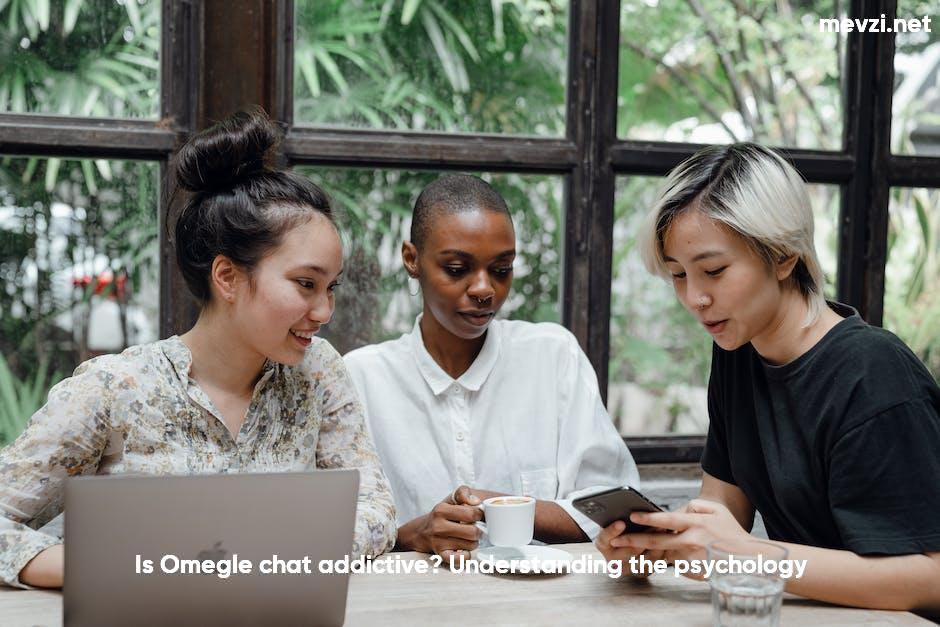Title: Understanding the Psychology of Omegle Chat Addiction
Introduction:
Omegle, a popular online chat platform, has gained immense popularity since its launch in 2009. With its anonymous and random chatting format, Omegle has attracted millions of users worldwide. However, concerns have been raised about the addictive nature of Omegle chat. This article aims to explore the psychology behind Omegle chat addiction and shed light on the reasons why individuals may become addicted to this virtual platform.
1. Instant Gratification:
Omegle chat offers immediate social interaction and gratification. Users can engage in conversations without any preconditions, which can be highly rewarding for individuals seeking quick connections. The instant gratification aspect can lead to a sense of excitement and anticipation, making it difficult for users to detach from the platform.
2. Anonymity and Identity Experimentation:
Omegle’s anonymous chat format allows users to explore different personas and experiment with their identity. This aspect can be enticing for individuals who may feel restricted or unsatisfied with their real-life personas. The ability to create new identities and engage in uninhibited conversations can create a sense of liberation and escapism, further intensifying the addictive potential of Omegle.
3. Thrill of the Unknown:
The thrill of encountering random strangers on Omegle can be addictive in itself. Humans are naturally curious creatures, and Omegle capitalizes on this curiosity by offering the possibility of connecting with people from different walks of life. This can create a sense of excitement and anticipation, compelling users to constantly seek new connections and conversations.
4. Social Validation and Attention-Seeking:
Omegle chat provides a platform for individuals to seek attention and validation from others. The constant flow of new conversations and the possibility of positive feedback can become addictive, particularly for individuals with low self-esteem or those who struggle with offline social interactions. The validation received on Omegle can create a cycle of addiction, as users seek more attention to boost their self-worth.
5. Escapism and Avoidance:
For individuals experiencing loneliness, boredom, or emotional distress, Omegle chat can serve as a coping mechanism and a form of escape. The online environment allows users to temporarily disconnect from their real-life problems and immerse themselves in virtual interactions. This escapism can be highly addictive, as it provides a temporary reprieve from reality.
Conclusion:
Omegle chat addiction can stem from various psychological factors such as instant gratification, anonymity, thrill-seeking, attention-seeking, and escapism. Understanding these underlying factors can help individuals recognize and address addictive patterns of behavior. Raising awareness about the potential pitfalls of Omegle chat addiction is crucial for promoting healthy online habits and maintaining a balanced approach to virtual interactions. 
The Lure of Omegle: Understanding the Addictive Nature of Online Chat Platforms
With the rise of technology, online chat platforms have become increasingly popular in recent years. One such platform that has gained significant attention is Omegle. This article aims to delve into the addictive nature of Omegle and shed light on the reasons why it has captivated millions of users worldwide.
Connecting the World, One Chat at a Time
Omegle is an anonymous online chat platform that allows users to connect with strangers from all around the globe. The allure lies in the excitement of not knowing who you will meet next. Whether it’s seeking companionship, exploring different cultures, or simply to entertain oneself, Omegle offers a unique experience that keeps users coming back for more.
The Thrill of the Unknown
One of the main factors contributing to the addictive nature of Omegle is the thrill of the unknown. Each connection made on Omegle presents an opportunity for a new and unpredictable encounter. This element of surprise acts as a driving force, making users curious and eager to explore further.
Additionally, Omegle allows individuals to converse without any restrictions or filters. This freedom creates an environment where users can express themselves without fear of judgment or consequences. The sense of liberation experienced on Omegle is another contributing factor to its addictive appeal.
A Social Escape
For many individuals, Omegle serves as an escape from the realities of their everyday lives. In a world where social interactions are increasingly digital, Omegle offers a platform to connect with others on a more personal level. Loneliness and social isolation are prevalent in today’s society, and Omegle provides an outlet for individuals seeking socialization and human connection.
Impact on Mental Well-being
Despite its undeniable allure, it’s essential to recognize the potential negative effects of excessive Omegle usage on mental well-being. Spending excessive amounts of time on the platform can lead to social withdrawal, feelings of loneliness and even addiction. It’s important for users to be mindful of their usage and engage in a healthy balance of online and offline interactions.
- Limiting screen time is crucial in maintaining a healthy lifestyle while still enjoying the benefits of Omegle.
- Seeking support from friends, family, or professionals can help overcome any negative experiences or addiction related to online chat platforms.
- Engaging in alternative activities such as hobbies, sports, or face-to-face interactions can further enhance one’s well-being.
In conclusion, Omegle provides an enticing and addictive online chat experience for users worldwide. The thrill of the unknown, freedom of expression, and the ability to connect with others have made it a popular choice among individuals seeking companionship and socialization. However, it’s important to be aware of the potential negative implications and maintain a healthy balance between online and offline interactions. By doing so, users can fully enjoy the benefits of Omegle while prioritizing their mental well-being.

The psychology behind Omegle addiction: What drives individuals to spend hours on chat roulette?
Omegle, the anonymous chat platform, has become a popular online destination for individuals seeking random conversations with strangers. It offers users the opportunity to connect with people from all around the world, with the click of a button. But why are some individuals so addicted to Omegle that they spend hours on end chatting away?
The answer lies in the psychological aspects of human behavior. One of the primary drivers behind Omegle addiction is the element of novelty. The human brain is wired to seek out new and exciting experiences, and Omegle provides just that. Every chat session brings the possibility of meeting someone completely different, with unique perspectives and backgrounds. This novelty factor can be highly stimulating and addictive for some individuals.
The anonymity factor also plays a significant role. Omegle allows users to engage in conversations without revealing their true identity. This sense of anonymity creates a feeling of freedom and liberation for many users. It offers an escape from the constraints of the real world and allows individuals to express themselves without fear of judgment or consequences.
Furthermore, the chat roulette format of Omegle adds an element of unpredictability to the experience. Users never know who they will be connected with next, and this sense of randomness can be incredibly captivating. It keeps users on their toes and creates a sense of anticipation and excitement.
- Loneliness and social isolation are also contributing factors to Omegle addiction. In today’s fast-paced digital era, more and more individuals are experiencing feelings of loneliness and disconnect. Omegle provides an opportunity for these individuals to connect with others, even if only briefly. The temporary companionship and social interaction offered by Omegle can alleviate feelings of isolation, making it appealing to those seeking human connection.
- The thrill of risk-taking is another driving force behind Omegle addiction. Engaging in conversations with anonymous strangers carries an inherent element of risk. Users never know what they will encounter or how the conversation will unfold. This thrill-seeking behavior can be highly addictive for individuals who enjoy stepping outside of their comfort zones and embracing the unknown.
- Addiction to Omegle can also be attributed to the dopamine rush experienced during interactions. Dopamine is a neurotransmitter associated with pleasure and reward. When users receive positive responses or have enjoyable conversations on Omegle, it triggers a release of dopamine in the brain, reinforcing the addictive behavior.
In conclusion, the psychology behind Omegle addiction can be attributed to various factors, including novelty, anonymity, unpredictability, loneliness, risk-taking, and the dopamine rush. It is essential to recognize the potential addictive nature of platforms like Omegle and establish healthy online habits. Balancing online interactions with real-life connections is crucial for personal well-being and maintaining a healthy social life.

Exploring the addictive qualities of anonymous online interactions: A closer look at Omegle
With the rise of social media and online communication platforms, anonymous online interactions have become increasingly prevalent. One such platform that has gained significant attention in recent years is Omegle. In this article, we will delve into the addictive qualities of anonymous online interactions and closely examine Omegle as a prime example.
Omegle, a free online chat platform, allows users to anonymously connect with strangers from all around the world. The allure of Omegle lies in its unpredictability and the opportunity to engage in conversations with individuals outside one’s social circle.
One of the addictive qualities of Omegle is the sense of curiosity it stimulates. Users never know who they will encounter next on the platform, which creates an element of surprise and excitement. This unpredictability can be highly enticing, leading users to spend hours on end engaging in conversations and exploring different perspectives.
Another factor contributing to the addictive nature of Omegle is the anonymity it provides. Without the need to reveal personal information, users can feel a sense of liberation and escape from the pressures of real-life interactions. This anonymity allows users to express themselves more freely, leading to uninhibited conversations and the formation of connections that might not have been possible otherwise.
However, the addictive qualities of Omegle should not be taken lightly. Spending excessive amounts of time on the platform can have detrimental effects on one’s mental well-being. The constant need for validation and the pressure to maintain interesting conversations can cause stress and anxiety. It is crucial for users to be aware of the potential risks and monitor their usage to ensure a healthy balance between the online world and reality.
| Effects of Omegle Addiction | Prevention and Mitigation |
|---|---|
| Social Isolation: Excessive use of Omegle can lead to social withdrawal and a decrease in real-life social interactions. | Limiting screen time: Set specific time limits for using Omegle and engage in other meaningful activities. |
| Mental Health Issues: Addiction to Omegle may contribute to feelings of loneliness, depression, and anxiety. | Seeking professional help: If you notice any negative effects on your mental well-being, reach out to a therapist or counselor. |
| Self-Validation: Relying on constant approval from anonymous individuals can negatively impact self-esteem. | Foster real-life connections: Focus on building relationships with people you know and trust in your offline life. |
In conclusion, exploring the addictive qualities of anonymous online interactions, particularly on platforms like Omegle, reveals the allure and risks associated with such experiences. While the sense of curiosity and anonymity can be enticing, it is important to be mindful of the potential negative effects on mental well-being. By maintaining a healthy balance and seeking meaningful connections offline, users can navigate the world of anonymous online interactions responsibly.

The role of social anxiety in Omegle addiction: How does this online platform provide an escape?
Omegle is an online platform that has gained immense popularity in recent years. It allows individuals to engage in anonymous video chats with strangers from all over the world. While it may seem like a harmless way to pass the time, there is a darker side to Omegle addiction that is often overlooked. In this article, we will explore the role of social anxiety in Omegle addiction and how this online platform provides an escape for individuals struggling with social anxiety.
Social anxiety, also known as social phobia, is a common mental health disorder that affects millions of people worldwide. It is characterized by an intense fear of social situations and a constant worry of being judged or humiliated by others. People with social anxiety often experience physical symptoms such as rapid heartbeat, sweating, trembling, and difficulty breathing when faced with social interactions.
For individuals with social anxiety, Omegle provides a unique opportunity to interact with others without the fear of judgment or rejection. The anonymous nature of the platform allows users to present themselves however they choose, free from the constraints of their social anxiety. This can be incredibly liberating for those who struggle with face-to-face interactions.
In addition to providing an escape from social anxiety, Omegle also offers a sense of connection and belonging. The platform allows individuals to connect with people from different parts of the world, expanding their social circle and providing them with a broader perspective on life. This can be particularly enticing for those who feel isolated or lonely due to their social anxiety.
- Increased feelings of acceptance and validation
- Opportunity to develop social skills and confidence
- Exposure to different cultures and perspectives
- Escape from the pressures of face-to-face interactions
- Source of entertainment and distraction
However, it is important to note that while Omegle may provide temporary relief from social anxiety, it is not a long-term solution. In fact, relying too heavily on this online platform can exacerbate social anxiety symptoms and further isolate individuals from real-life social interactions.
If you or someone you know is struggling with social anxiety and Omegle addiction, it is important to seek professional help. Therapies such as cognitive-behavioral therapy (CBT) have been proven effective in treating social anxiety and can provide individuals with the necessary tools to overcome their fears and develop healthy social connections.
In conclusion, social anxiety plays a significant role in Omegle addiction. This online platform serves as an escape for individuals struggling with social anxiety by providing them with a safe space to interact with others without fear of judgment or rejection. However, it is crucial to remember that real-life social interactions are essential for personal growth and well-being. Seeking professional help is key to managing social anxiety and finding healthy ways to connect with others.

From curiosity to compulsion: Unraveling the addictive pull of Omegle chat
Are you familiar with Omegle chat? It is an online platform that connects you with random strangers from around the world. Initially created as a means to meet new people and have interesting conversations, Omegle chat has slowly evolved into something much more addictive.
One of the reasons behind Omegle chat’s addictive pull is the element of curiosity. Human beings are naturally curious creatures, always seeking new experiences and connections. Omegle chat provides the perfect outlet for this curiosity, offering the opportunity to engage with individuals you would never normally encounter in your day-to-day life.
Another factor contributing to Omegle chat’s addictive nature is the anonymity it offers. By using anonymous usernames, users can interact without the fear of judgment or consequences. This anonymity creates a sense of freedom and empowerment, allowing individuals to express themselves in ways they might not feel comfortable doing in their real lives.
Omegle chat also taps into our innate desire for social interaction. In today’s digital age, where social media often dominates our interactions, Omegle chat provides a refreshing change. It allows us to have real-time conversations with strangers, engaging in meaningful and thought-provoking discussions.
- However, with addiction comes the dark side of Omegle chat. Many users become consumed by the platform, spending countless hours scrolling through chats and seeking validation from strangers.
- The addictive elements of Omegle chat are not to be taken lightly. Studies have shown that excessive use of the platform can lead to social withdrawal, decreased productivity, and even mental health issues.
- If you find yourself falling into the addictive trap of Omegle chat, it is essential to take a step back and evaluate your usage. Set limits for yourself, both in terms of time spent on the platform and the types of conversations you engage in.
- Seeking support from friends, family, or professional help is also crucial. Breaking free from the addictive pull of Omegle chat is not easy, and having a strong support system can make all the difference.
In conclusion, Omegle chat offers an intriguing and addictive experience for users. Its elements of curiosity, anonymity, and social interaction make it difficult to resist. However, it is essential to be aware of the potential dangers of addiction and take the necessary steps to maintain a healthy balance.
Remember, curiosity can lead to discovery, but compulsion can lead to destruction. Use Omegle chat responsibly and prioritize your well-being above all else.
Frequently Asked Questions
Is Omegle chat addictive?
Yes, Omegle chat can be addictive for some individuals. The platform provides instant connections with strangers, creating an exciting and unpredictable experience that can be difficult to give up.
What makes Omegle chat addictive?
Omegle chat is addictive due to its novelty and the feeling of anonymity it provides. The constant anticipation of meeting new people, engaging in conversations, and the thrill of the unknown can all contribute to its addictive nature.
How can I control my Omegle chat addiction?
To control your Omegle chat addiction, it is important to set boundaries and limit your usage. Consider implementing specific time slots for using the platform, engaging in alternative activities, and seeking support from friends or professionals if needed.
Are there any negative effects of Omegle chat addiction?
Yes, Omegle chat addiction can have negative effects on various aspects of life. It can lead to time and productivity loss, social isolation, decreased communication skills, and even psychological distress in extreme cases.
Is there a way to enjoy Omegle chat without getting addicted?
Yes, it is possible to enjoy Omegle chat without getting addicted. The key is to establish a healthy balance by setting limits, being mindful of your usage, and prioritizing real-life social interactions over virtual ones.

